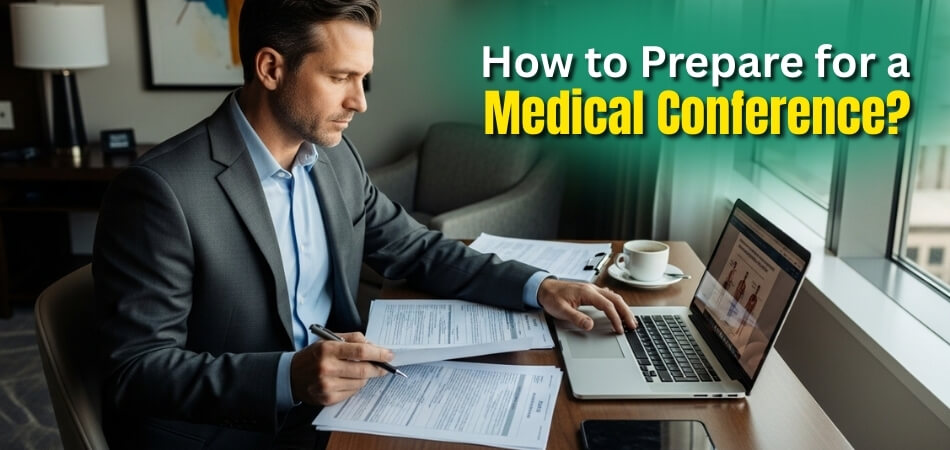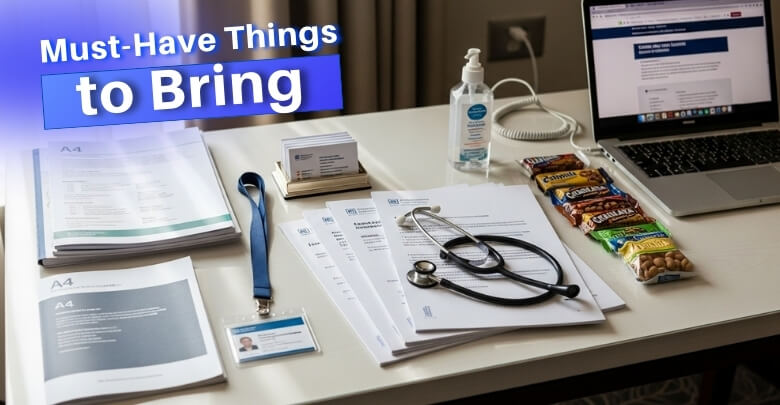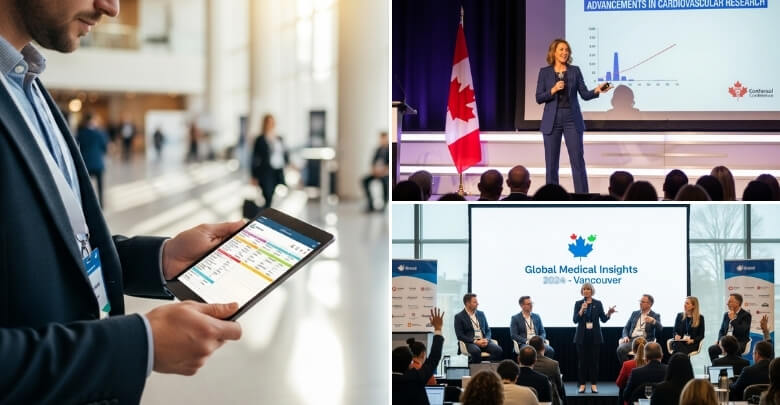A medical conference is a great chance to learn new things, meet people, and grow in your career. But with so many talks, sessions, and networking events, it can feel a little too much if you’re not ready. Going in with a clear plan will help you enjoy the experience and make the most of it.
So, how to prepare for a medical conference?
Start by setting simple goals. For instance, learning about new topics, meeting other professionals, or sharing your own research. Check the agenda, speakers, and venue in advance. Pack your notes, presentations, and business cards, and make time for short breaks.
In the rest of this article, we’ll walk you through easy steps to get fully prepared.
How to Prepare for a Medical Conference?
Medical conferences provide doctors and researchers with valuable opportunities to exchange knowledge and ideas. They allow professionals to find new methods and technologies that improve healthcare quality worldwide. Here is how you can prepare for the conference:

Set Clear Goals
Before attending, identify what you want to achieve during the event. You may focus on networking, learning specific topics, or presenting your research findings. Clear goals help guide your choices and ensure meaningful use of your time. Without defined objectives, conferences can feel overwhelming and less rewarding.
Write your goals in a notebook or digital planner for quick reference. Break them into achievable steps, such as sessions to attend or people to meet. This approach helps you track progress and prevents distractions during the conference. Strong preparation ensures the event contributes effectively to your professional development.
Research Conference Details
Start by reviewing the agenda, key speakers, and event themes. Knowing session times and topics helps you create a realistic daily schedule. Researching speakers beforehand allows you to prepare meaningful questions for discussion. This preparation increases your chances of gaining valuable insights during presentations.
Don’t forget logistics such as venue location, maps, and transportation options. If the conference spans multiple days, plan lodging nearby for easy access. Detailed planning works for global events and even regional ones, such as conferences in Vancouver, or where schedules, venues, and travel connections matter just as much.
Organize Conference Materials
Gather everything you need at least one week before the event. This includes presentation slides, printed handouts, or research summaries. Always bring business cards to exchange information with professionals you meet. Carrying required clinical tools, if relevant, can support your participation.
Store materials neatly in labeled folders or digital files for quick access. Backing up documents in cloud storage ensures nothing is lost. Carry a small notebook for handwritten notes during sessions. Preparedness helps you engage fully without last-minute stress.
Plan Schedule
Review the conference agenda carefully and highlight priority sessions. Identify keynote speeches, panel discussions, and workshops most relevant to your goals. Allocate time for networking events where meaningful conversations often occur. Balance sessions with scheduled breaks to maintain energy throughout the day.
Plan your meals and hydration to stay energized and attentive. Don’t overload your schedule, as rushing limits your ability to absorb knowledge. Flexibility allows you to adjust if new opportunities arise unexpectedly. A balanced schedule supports both learning and professional relationship-building.
Prepare for Networking
Create a short personal introduction, also known as an elevator pitch. It should highlight your background, research interests, and professional goals. Practice delivering it confidently to make strong first impressions. A clear introduction helps you connect easily with other participants.
Be proactive in starting conversations with peers and experts. Listening attentively builds trust and makes interactions more meaningful. Exchange business cards and follow up through email afterward. Networking efforts can lead to collaborations that extend beyond the conference.
Packing Essentials
Choose professional clothing that is both comfortable and presentable. Comfortable shoes are necessary because you may walk or stand for long hours. Bring health essentials such as prescribed medicines, water, and snacks. Always include devices like laptops or tablets for note-taking.
Pack chargers, adapters, and backup batteries to avoid disruptions. Carrying a reusable water bottle keeps you hydrated. Store essentials in an organized travel bag for convenience. Smart packing ensures you focus on learning without worrying about basic needs.
Mental Preparation
Rest well before the conference begins to stay alert. Adequate sleep supports memory and concentration during sessions. Set personal intentions such as staying curious and open to new ideas. A positive mindset enhances your overall experience.
Prepare strategies to handle stress or crowded environments. Take short breaks outside the venue if needed for relaxation. Remind yourself why attending matters for your growth. Mental readiness allows you to stay engaged throughout the event.
Why Should You Be Prepared for a Medical Conference?
Medical conferences give you the chance to learn, meet people, and grow.
Being ready makes the whole event easier to enjoy. Good preparation helps you use your time well and return with more value.
Build Strong Professional Connections
- Knowing your goals helps you meet people more easily. It guides your talks and makes connections naturally.
- A short, clear introduction makes you confident. People understand who you are and want to connect again.
- Carrying business cards shows respect and care. Sharing them helps others remember you and follow up later.
Gain More Knowledge from the Sessions
- Looking at the agenda before it helps you choose wisely. You can focus on sessions that fit your interests best.
- Writing simple questions makes talking more useful. Asking after sessions gives you answers and a deeper understanding quickly.
- Picking the right sessions saves time and energy. You learn what matters most and avoid feeling overloaded.
Present Your Research Confidently
- Practicing slides early makes you calm. Clear slides help your audience follow and connect with your work.
- Rehearsing your talk builds confidence. Each practice round makes you better and more sure on stage.
- Having notes and handouts ready shows effort. It makes people respect your work and remember your presentation.
Manage Time Effectively
- A clear plan keeps your day smooth. You can enjoy talking without rushing or missing important events.
- Short breaks keep your mind fresh. Pausing helps you stay sharp and ready for the next session.
- Planning meals and rest saves stress. You stay alert and ready to join discussions or networking times.
Improve Networking Opportunities
- A short pitch helps you stand out. People understand your focus and remember you later with ease.
- Sending a short note after a meeting keeps the bond. It can grow into chances for work or study.
- Knowing who you want to meet gives you purpose. It makes your time more useful and rewarding.
Avoid Last-Minute Stress
- Packing early keeps things simple. You have what you need without rushing or feeling worried.
- Planning travel helps you arrive calm. Knowing where to go saves time and avoids stress.
- Checking the venue map helps you move fast. You find rooms easily and enjoy the sessions more.
Strengthen Career Growth
- Being ready shows you care about your field. People see you as serious and committed to growth.
- Sharing smart ideas makes you shine. Others notice your input and may remember you for future roles.
- Preparation leaves a lasting impact. It can bring offers, projects, or invites that move your career forward.
Enhance Personal Growth
- Conferences push you to try new things. Being ready makes these steps feel easier and less scary.
- Feeling prepared builds confidence fast. You enjoy learning and return with more trust in your abilities.
- A balanced plan helps you stay happy. You learn well while also enjoying breaks and quiet times.
What are the Must-have Materials to Bring to a Medical Event?
Medical events are exciting because they bring together doctors, students, and experts from many different places. These gatherings are full of learning, discussions, and opportunities to meet new people with shared interests. But they can also feel overwhelming if you arrive unprepared and forget important things at home. Here are the things you can bring to save time, reduce stress, and make the event smoother:
Essential Documents
Carrying your documents is one of the most important parts of preparing for a medical event. You’ll need your registration confirmation, an ID card or passport, and the badge provided at registration. Travel papers like visas or invitation letters are equally important when the event is abroad. Business cards and an updated résumé help if you’re meeting people who may want to connect later.
Professional Materials
Bringing your professional materials makes you feel more confident and prepared. Keep printed and digital copies of your papers, posters, or handouts ready. If you’re joining workshops, pack items like a white coat or stethoscope if needed. Quick reference guides or abstracts are useful during sessions, especially when a topic matches your area of interest. Staying organized with these items lets you participate without worry.
Care and Comfort
Taking care of yourself during the event is just as important as preparing your work materials. Bring your daily medicines and simple first-aid items like pain relievers. Keep hand sanitizer, tissues, and snacks with you to stay fresh and energized. Comfortable clothes and shoes make long days much easier to handle. Small items like a compact mirror or makeup kit can help you feel confident quickly.
Tech and Tools
Technology helps you stay connected and ready during medical events. A laptop or tablet with a charger is often necessary. Always carry a power bank and USB drive with backup files to avoid problems. A slim tote or backpack makes carrying everything easier. If you’re traveling abroad, bring an adapter for charging devices and a notebook for quick note-taking.
Preparing these items in advance keeps you ready and confident during the event. Many professionals even find ways to attend medical conferences for free, but being prepared is still the real advantage. With the right essentials, you’ll enjoy the experience more and focus on learning.
How to Optimize Your Networking at a Medical Conference?
Medical conferences are full of learning opportunities and new people who share similar interests. Connecting with others here can shape your career. Networking doesn’t need to feel stressful when you prepare ahead with small but powerful steps. Let’s look at practical ways to make your interactions easier and more useful.
- Clear Goals: Decide what you want before arriving at the venue. Knowing your priorities helps you focus and meet the right people.
- Short Introduction: Prepare a simple self-introduction that shows your background and interests. A quick pitch makes conversations smoother and leaves a strong impression.
- Listen Well: Pay close attention when others share their thoughts or ideas. Good listening shows respect and helps build meaningful professional connections.
- Join Sessions: Attend smaller group discussions and workshops with interest. These places allow you to talk more freely and meet people personally.
- Business Cards: Keep cards ready to exchange during talks or breaks. Sharing them quickly makes people remember you and continue communication later.
- Follow Up: Send a short email or message within days of the meeting. Quick follow-ups keep relationships alive and open new opportunities.
- Stay Relaxed: Smile, stay confident, and don’t rush during talks. A calm approach helps people feel comfortable and interested in you.
Tips for Effective Time Management During Conferences
Conferences can feel exciting because there are so many talks, workshops, and events happening all at once. Without some planning, the day may seem busy and confusing, making it hard to focus. Time is valuable when you’re trying to learn and connect. With simple strategies, you can enjoy more and stress less during the event.
Plan Ahead
Look at the agenda before the conference starts and circle the sessions that matter most to you. Pick the talks, workshops, or keynote events that connect with your goals. Make a list of those activities so you don’t miss anything important. Preparing early helps you start the event with confidence.
Set Priorities
It’s easy to want to attend every single session, but that isn’t always realistic. Choose the events that bring the most value to your learning. Focus on what gives you fresh ideas, skills, or chances to meet helpful people. Strong priorities stop you from feeling overwhelmed.
Block Time
Organize your day by grouping activities so you don’t run back and forth between rooms. Write down breaks, meals, and any personal meetings in your schedule. Try not to multitask because it reduces focus and makes it harder to remember. A steady plan keeps you calm and efficient.
Take Notes
Always keep a notebook or digital tool ready for capturing important points. Write down questions, interesting ideas, or details to check later. Notes help you remember key details when the event is over. Reviewing them afterward makes everything you learned more useful.
Use Technology
Conference apps, digital calendars, or reminders can help you stay on track. They give real-time updates about changes in sessions or speaker times. You can also use digital card apps to collect contact details from new people. These tools make organizing your time much easier.
Follow Up
When the conference ends, set aside time to review your notes and highlight key lessons. Reach out to people you connected with to keep those relationships strong. If you attend a medical conference in Vancouver or in other cities known for hosting international events, you’ll likely meet professionals from around the world, making follow-up even more important.
FAQs about Medical Conference Preparation
Preparing for a medical conference is about more than just packing a bag. Many small details can make your experience smoother. Here are some frequently asked questions that can help you prepare better for your event.
How Early Should I Register for a Conference?
Register at least a few months before the event to secure your place. Early registration often provides reduced fees and better access to workshops. It also allows time for travel arrangements, visa applications, and planning your schedule carefully.
What Should I Research About the Speakers?
Check the background, topics, and recent work of key speakers before attending. Knowing their expertise helps you ask meaningful questions and connect after sessions. Understanding speaker profiles also helps you decide which sessions fit your goals and interests best.
How Can I Prepare Questions for Sessions?
Write down possible questions while reviewing the conference agenda and topics. Keep them clear and specific so they encourage useful answers. Prepared questions show your interest and make discussions more valuable, helping you connect with speakers and other participants effectively.
Should I Practice Public Speaking Before Attending?
Yes, practice helps if you expect to speak during networking or presentations. A few rehearsals improve clarity and confidence. Even short self-introductions become smoother when practiced. Preparing early ensures you communicate well and leave a professional impression on others.
What’s the Best Way to Manage Travel Stress?
Plan travel details such as flights, hotel bookings, and local transport well in advance. Carry necessary documents together in one folder for easy access. Arrive early if possible to settle in calmly. Travel preparation reduces stress and helps you stay focused.
How Can I Prepare My Mindset for Conferences?
Set simple goals, stay open to new ideas, and manage expectations. Conferences can be intense, so mental preparation is essential. Remind yourself to enjoy learning and meeting people. A positive mindset improves your confidence and experience during the event.
What Should I Do If I’m Attending Internationally?
Review entry requirements like visas, vaccinations, and customs rules early. Research local culture and prepare essentials like adapters or currency. International conferences require extra planning, but being prepared ensures smoother travel, fewer surprises, and a more enjoyable learning experience.
How Do I Make Use of Downtime at Conferences?
Downtime can be useful for reviewing notes or networking casually. Take short breaks to recharge and avoid burnout. Use free moments to connect with peers informally. Balancing activity with rest ensures you stay focused and get more from the event.
Closing Remarks
A medical conference can feel busy, but being ready makes it much easier to enjoy. Simple steps like setting goals, planning your schedule, and packing essentials help a lot. You also learn more when you rest, stay focused, and take short breaks.
Knowing how to prepare for a medical conference makes the whole event less stressful and more useful. You return home with new ideas, helpful notes, and strong connections. With the right preparation, every talk and meeting feels meaningful. That’s how a conference becomes more than just an event—it becomes a real chance for growth.







